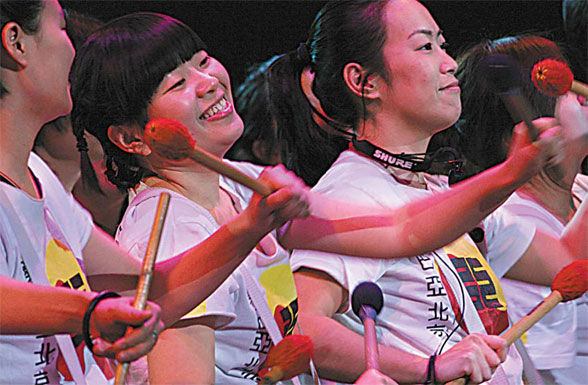|

Playing drums together fulfills the life of the SambAsia members. Jiang Dong
|
Percussionist Jimmy Biala moves around the stage, amid microphones, instruments and a drum machine, drawing a range of sounds from his drums, with his fingernails and hands.
He sets a beat, floats a melody above it with a vocal, riffs for a while and then changes up the rhythm to lift the crowd once more. Around him are 16 young men and women, wearing white T-shirts with the logo "SambAsia". Their layered drums and voices combine with Biala's. Then, Biala pauses and cues the audience to move their feet, jumping and dancing as he sings.
"It's easy, one-two-three-four, then turn around and shake your shoulders," he says playing drums and inviting one of the group's members to give an example. The music has the 300-strong audience celebrating Brazilian-style for three hours.
As the leader and artistic director of SambAsia Beijing, Biala knows just how long a beat can hold the attention, and when a change is welcome. With Biala's sure sense of timing, his complex music always sounds spontaneous and playful.
"There are great drummers and singers in our team who I feel very proud of," Biala says.
Born to Philippine parents and brought up in San Francisco, Biala, 48, has studied percussion music in Cuba, Brazil and the United States since he was 7 years old. He has spiced up all kinds of music with Brazilian percussion over the past few years and now he's put together the community-based organization, SambAsia Beijing.
Last Friday, at Starlive, it turned rhythms into melodies and tunes into grooves - heady, exhilarating, unpredictable music.
"For various reasons, the people in SambAsia are addicted to and excited by the drum. Though everyone usually feels tired after a performance they have their regular jobs during the day.
"Though most of the group has not performed music before, or even played an instrument, they have discovered the communal passion of studying and playing drums together here, in the community,"
The original ensemble was formed in San Francisco, California, US, in Sep 2002. It was Biala's idea to build cultural bridges between diverse communities in the San Francisco Bay area. This was accomplished by combining Brazilian drumming with music and dance traditions from Asia.